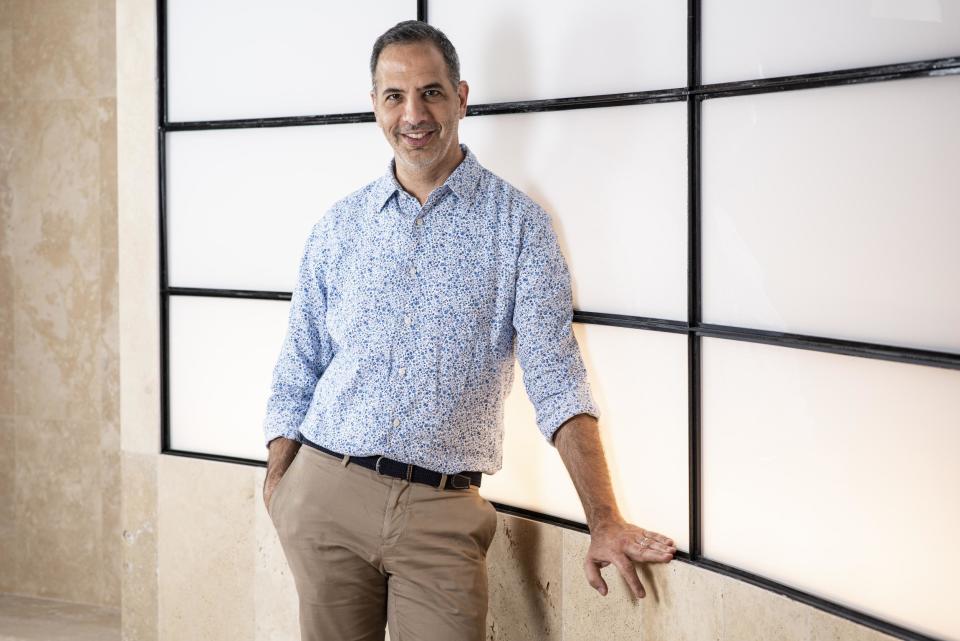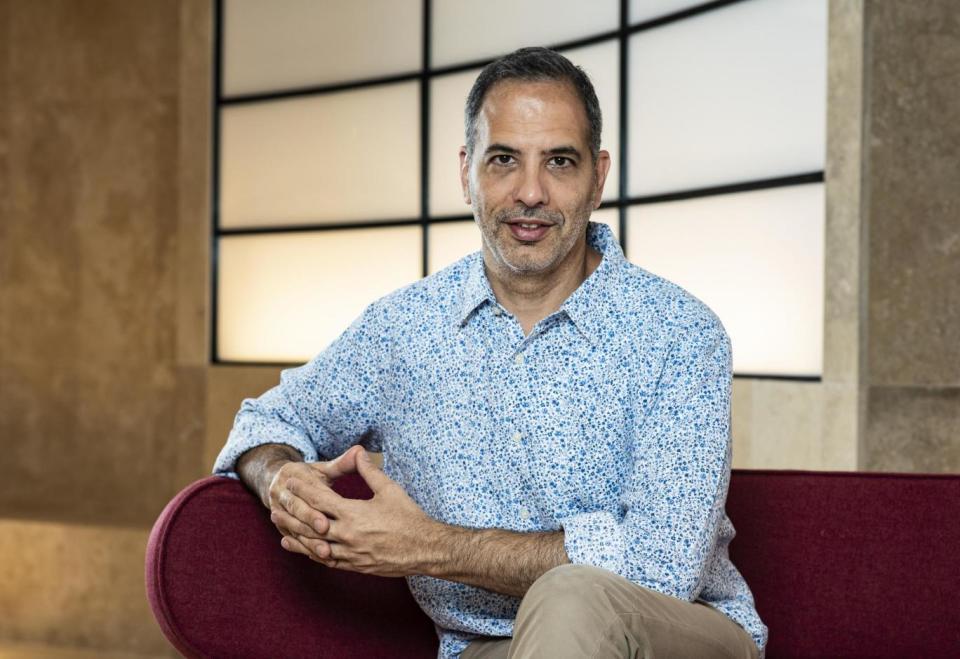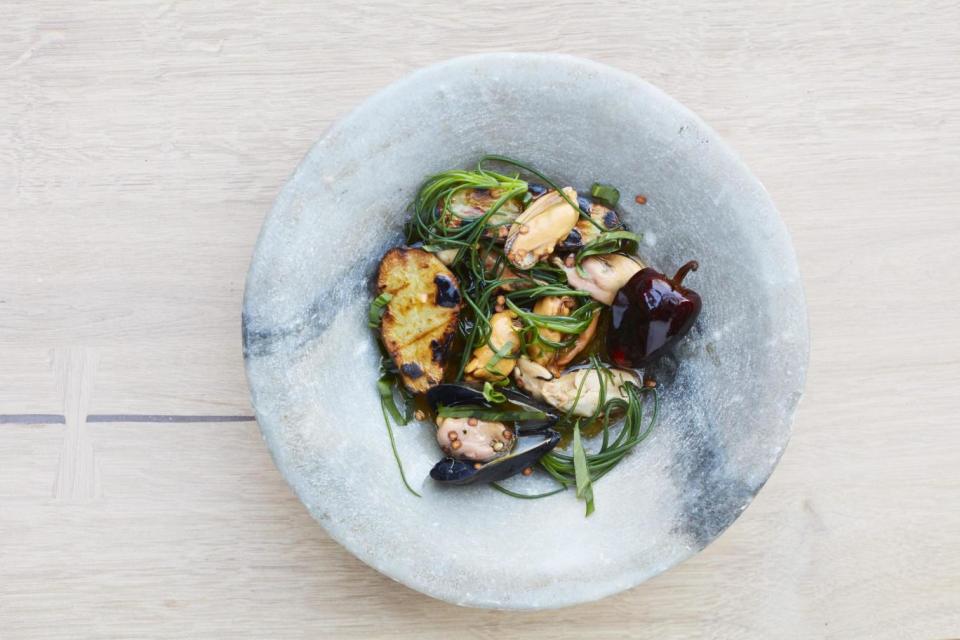Yotam Ottolenghi: I don't know about dining out - I like Pizza Express

Yotam Ottolenghi, the man who revolutionised how London eats, is extolling the virtues of a dish that couldn’t be further removed from his intricate, vegetable-centric creations: instant noodles.
“Often when I come home from work and I’ve missed dinner with my family I have instant noodles with a beer,” says the restaurateur.
“It’s fine, it’s part of life. I go to Chinatown and buy Japanese ones, which are full of crazy stuff like dehydrated vegetables. Or I get those posh ones from Waitrose.”
There is a similarly Asian influence at ROVI, Ottolenghi’s new restaurant, where we’ve met for a strong coffee. In a blue floral shirt with neat stubble, Ottolenghi is a picture of Zen, despite the drilling going on around us to get ROVI ready to open today. It’s his sixth establishment, and its name is a riff on its Fitzrovia location.
Conversation turns to Anthony Bourdain, the celebrity chef who died two weeks ago aged 61 in a suspected suicide. They met when Bourdain made a programme about Jerusalem and Ottolenghi, who grew up there, showed him around. “I’m still in shock,” says Ottolenghi.
“I had no idea he was struggling. Tony is the most curious human being but also a very thorough person; when you tell him something he doesn’t just accept it, he wants to know more and dig underneath the narrative, whether it is food related or not. That’s what people loved about him. He was like an anthropologist who unravels truths even if they are not pleasant. He was an innovator in TV."

When they went to Israel and Palestine together, Ottolenghi says, “he juxtaposed the settlers in the West Bank with Hamas in Gaza and said there is no easy way to show it, but the world is great but also real. That was part of his personality and ethos. He was a good, passionate person who never said no to anyone.”
The food world can attract “people who are a bit lost and don’t fit in”, adds Ottolenghi.
“Tony tried to make this point. Over the years he had family, success, he was part of the establishment but possibly inside he still felt like that person who had just arrived in the kitchen, a bit useless, lonely and needing that sense of family.”
The adrenaline of the kitchen “can be a good distraction” from one’s own problems. “But it can be destructive; you are on the one hand very busy but you are not really focusing on yourself,.”
Ottolenghi loves Bourdain’s shows, but he doesn’t care for the more competitive food shows — Bake Off excepted. Would he like to make more programmes himself? “TV takes a lot of time and I have young kids so I don’t want to be away for so long. I’ve given up a few opportunities because of that.” Surely there’s time for him to make more shows when the kids are older? “I’m not that young,” he says seriously.
He looks young, though. He’s 49, does Pilates twice a week and is a qualified instructor. Noodle fixes aside, he is “pretty disciplined” about food. But he struggles with making sure his children eat well. He and his husband Karl, who he met at the gym 18 years ago, have two sons, Max and Flynn, aged five and three respectively, born to surrogates. Karl is a house husband.

“I’m in this conundrum where you don’t want to say no to sugar constantly but on the other hand you don’t want to normalise it,” says Ottolenghi. “So you find yourself like a stupid parrot saying ‘no’ all the time, because the kids point to things they want with sugar in all the time. It’s everywhere. Just on the way to school there’s three ice cream places.” Max is already excited about starting “big school” in September and wearing a uniform.
The family live in Camden and Ottolenghi spends any free time with his sons in Regent’s Park. Looking abashed, he admits that he “doesn’t know much about dining out”. “I feel bad but I don’t like to be out in the evenings. We live around the corner from Pizza Express so once a week we go there. I like the Sloppy Joe one but it’s a bit spicy for the kids.”
What’s his go-to dish when he is feeling lazy? “These days, food has to be child-friendly. Their favourite is mujaddara, lentils and rice — they love it because of the fried onions; anything fried is sweet and delicious. I add a few spices to educate their palates.”
He pauses thoughtfully. “I make it sound like my kids are great eaters. They’re not, they can be fussy. The one thing is I try to give them food where I know what’s in it. But I don’t mind if they have fish fingers with friends.”
The kids go to a “great” nursery, where having two fathers is accepted. “We haven’t experienced anything negative but the kids are small so it might come. London is so diverse, though: people are used to seeing different set-ups.”
Max goes to a Hebrew language group one afternoon a week but Ottolenghi admits he can’t speak it: “I’ve failed miserably on that front I’m sorry to say.” When the family make pancakes at the weekend, the boys are interested and Ottolenghi likes to put them on the kitchen counter and tell them about what he’s making. “They want to know what’s in things but it’s just curiosity.”
Growing up, Ottolenghi remembers making macaroons from a children’s cookbook. “I ate the mix while we were cooking and there was nothing left. It didn’t really involve cooking, you just mix it all together, but it gets you into the kitchen.”
Ottolenghi is an accidental chef. He started out in academia. After he had submitted his masters thesis, on the ontological status of the photographic image in aesthetic and analytic philosophy, he needed a break and took a Cordon Bleu cookery course in London. From there, he and his friends Sami Tamimi and Noam Bar opened the first Ottolenghi deli in Notting Hill nearly 16 years ago.

“We never considered ourselves restaurateurs,” says Ottolenghi. “We were just excited to be making fresh pastries to go. It just evolved — we had a small table and people stayed.” He had a short spell as a waiter in Israel, serving daiquiris, but walked out because he was close to spilling something: “It’s not my thing, that’s why I respect good waiters.”
Does he ever complain at restaurants? “I hate it. I’m not good at confrontation but also if people know I’m a chef they will think I have an axe to grind.”
His own kitchen isn’t high-tech. But his spice drawer is a source of pride, and he explains it forensically. “The spices lean at an angle so you can see them and nothing gets lost at the back. It takes 60 jars and still gets messy but has all the potential to be super-organised.”
Mostly, he cooks in a test kitchen underneath a railway arch in Camden. That’s where the ROVI menu came into being. All the familiar Ottolenghi ingredients will be there but they’ve ventured into Asian territory, with dishes like tempura stems and tops, using the bits of vegetables that are often thrown away, such as beetroot leaves. And there’s a Scottish twist courtesy of head chef Neil Campbell, who is from Skye and has a way with cranachan — could this be the start of Scottolenghi? Ottolenghi lights up at the prospect.
“I never thought I’d have a cranachan parfait at one of my restaurants. Neil said ‘let me prove the dish to you’. The food I like is about a certain level of intensity. A modest Scandinavian-style affair with subtleties is not my thing. Neil made this beautiful oat brittle to go with it so it’s got this crunch for texture. As soon as he made it I thought of course that will fit.”
There is a “tension” between Ottolenghi’s own creative urge to experiment and his customers’ attachment to certain dishes. “It’s hard. When you take something off the menu you get a vocal reaction with people saying ‘Oh my god, that’s my favourite thing’. In most of our restaurants we have decided to just keep a few very popular dishes on so the regulars can come and feel they belong to them and then the rest changes.”
When Ottolenghi started out, he was conspicuous for the amount of attention he gave to vegetables. Now every other place seems to be vegan: “It’s almost like a revolution,” he says. Still, he has never tried to give up meat — he sees no need when he eats so many vegetables. “Our dishes are flexible, there’s this sweetheart cabbage at ROVI which has anchovies in it, but you can get it without.”
Meat substitutes are where he has “a problem”. “They’re never as good as the real thing. When people ask what can they substitute the meat with I tell them not to. There are so many delicious vegan dishes that do the job instead.”
Once the restaurant is open he’s off to Greece for two weeks with his family. “I’ll do some cooking, which I don’t do a lot during the year.” Although he’s the man who popularised prolific lists of ingredients, he likes cooking in Greece because that “there are few ingredients — all you get at the market are peaches, tomatoes, aubergines and herbs”. Other than that, he plans “to do more or less nothing for two weeks, although you can’t get bored with two little kids running around”.
59 Wells St, W1A 3AE, ottolenghi.co.uk/ROVI

 Yahoo News
Yahoo News 